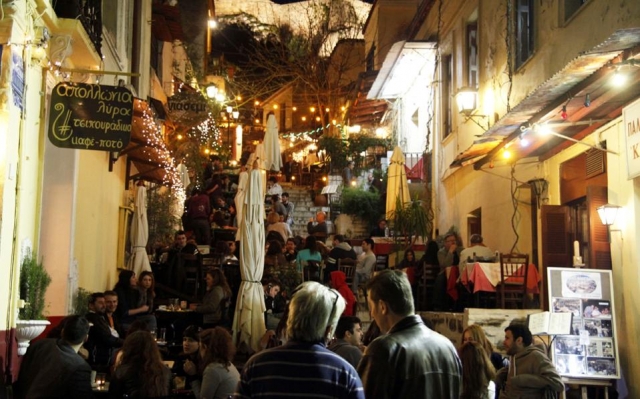photos www.kathimerini.gr
The 1960s and 70s saw Plaka’s decline. What caused this back then – neglect, greed, stupidity – is difficult to say, even for those who have spent their whole lives in the shadow of the Acropolis. Opinions, however, are more united when it comes to the reasons that led to the district’s revival in more recent decades. These were the targeted protection regulations, which closed certain establishments, imposed a number of restrictions and saved old buildings from demolition. At the end of the day, most of Plaka survived as one of the few traditional areas of Greece. Today it is under threat of extinction on ce again, and this time the alleged villain is the Ministry of Environment.
Clear signs
When back in the late 1970s the President came up with a decree qualifying Plaka as a traditional protected area, it was already showing clear signs of decay. The district had spent the decade being invaded by all sorts of tourist businesses: taverns, discotheques with neon signs, tourist enticements, brothels, etc. Dionysis Zivas oversaw the research teams, which elaborated a study of the Athens’ old part and specifically of Plaka. The President’s decree was based on this research. "Plaka had 90 nightclubs. Half of its inhabitants had already left, and those who had remained simply had nowhere to go," he explains. "the first study of the area was commissioned in 1973, and was completed in the following year. It gathered dust on bureaucrats’ desks for several years, until Stefanos Manos, then Deputy Minister of Housing, took it out. He asked us to put together a rescue plan for Plaka. In January 1979 the plan started materialising," says Zivas.

The Plaka salvation plan is innovative even from today's perspective. One of its first provisions established Plaka’s pedestrian areas. Others followed soon, addressing various urgent issues – from licences all the way to the street sign-boards. Plaka was given the status of a traditional area, with around 550 heritage buildings. The last piece of protective regulation came out in 1993.
"Plaka was the first area, which saw the introduction of a development strategy – by Stefanos Manos," says Yannis Michail, Vice President of the Elliniki Etaireia, the Hellenic Society for Protection of the Environment and Cultural Heritage. "The closing down of 42 establishments in a single day in 1983 was a clear sign of the government’s resolution to enforce the law. Plaka’s population started trickling back in over the following years, and the district recovered its human face."
A transitional clause
To prevent the instant shutdown of all Plaka’s restaurants and cafes, the new regulations contained a provisional clause: those establishments which had been licensed prior to 1982 and still belonged to the same owner, were allowed to stay open. This provision came into the crosshairs of the Ministry for the Environment, Physical Planning and Public Works in 2008, but its proposals were retracted after meeting vigorous resistance. The following years saw several attempts to have those imposed, but all of them failed. Now they have made their way into a draft law of the Ministry of the Environment, Energy and Climate Change, which became subject to vitriolic criticism lampooning it as the ‘draft law of kickbacks’. Its poor quality is betrayed by the fact that Athens City Council was not consulted over the proposed policy changes, the ministry doesn't know how many licences will be affected by them, and no impact assessment study has been carried out, as admitted by Deputy Minister Nikolaos Tagaras.
The mayor of Athens, Giorgos Kaminis, has also called for the suspension of the new policy package. He warned that he wouldn't tolerate the undermining of Plaka’s special status. The ministry has promised some changes but is unwilling to budge on the key provisions on licenses.
Dionysis Zivas believes that the policy proposals are misguided. He says they will scupper all the achievements of the last 30 years for the sake of somebody's business interests, which in turn will lead to a decline similar to the one of the 1970s.